Author: Nina Paavolainen
Alexandra Salmela: 27 eli kuolema tekee taiteilijan [27, or death makes the artist]
13 January 2011 | Mini reviews, Reviews
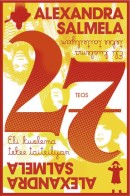 27 eli kuolema tekee taiteilijan
27 eli kuolema tekee taiteilijan
[27, or death makes the artist]
Helsinki: Teos, 312 p.
ISBN 978-951-851-302-8
€ 25.90, hardback
Alexandra Salmela (born 1980) is a Slovakian-born dramaturge and literature graduate who has settled in Finland. The book’s main character, Angie, lives in Prague and suffers from an idée fixe: all her idols, such as Jimi Hendrix, Kurt Cobain and Janis Joplin, died, already famous, before their 28th birthdays, but her own literary career has yet to take wing. The frustrated Angie’s literature lecturer has a lake cottage in Finland where Angie meets an eco-minded family in the middle of the sparsely populated Finnish countryside. The clash between the chaotic family life and Angie’s wannabee artistic temperament are skilfully handled by Salmela, who has a secure grasp of literary means and a playful use of the Finnish language. Among the narrative voices employed by Salmela are the family’s cat and a piggy toy. Situational comedy, farce and a tragic Entführungsroman combine in the narratives, and the result is a malicious, funny work that pokes fun at everyone. The novel was awarded the Helsigin Sanomat newspaper’s prize for the best first novel, and appeared on the shortlist for the Finlandia Prize for Literature.
Markus Nummi: Karkkipäivä [Candy day]
26 November 2010 | Mini reviews, Reviews
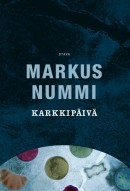 Karkkipäivä
Karkkipäivä
[Candy day]
Helsinki: Otava, 2010. 383 p.
ISBN 978-951-1-24574-2
€28, hardback
Like this one, Markus Nummi’s previous novel, Kiinalainen puutarha (‘Chinese garden’, 2004), set in Asia at the turn of the 20th century, involves a child’s perspective. Karkkipäivä‘s main theme, however, is a portrait of contemporary Finland. Tomi is a little boy whose alcoholic parents are incapable of looking after him; Mirja’s mother is a frantic workaholic heading for a nervous breakdown. She is a control freak who secretly gorges on chocolate at work and beats her little daughter – a grotesque portrait of contemporary womanhood. Tomi manages to get some adult attention and help from a writer; the relation between them gradually builds into one of trust. Katri is a social worker, empathetic but virtually helpless as part of the social services bureaucracy. Virtually every adult suspects others of lying, finding each other’s motives doubtful. Nummi (born 1959) has structured Karkkipäivä with great skill; the ending, in which matters are resolved almost by chance, is particularly gripping. This novel was nominated for the 2010 Finlandia Prize for Fiction.
Matti Yrjänä Joensuu: Harjunpää ja rautahuone [Harjunpää and the iron room]
19 November 2010 | Mini reviews, Reviews
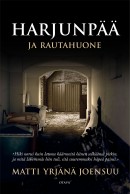 Harjunpää ja rautahuone
Harjunpää ja rautahuone
[Harjunpää and the iron room]
Helsinki: Otava, 2010. 302 p.
ISBN 978-951-1-24742-5
€ 26, hardback
This book’s shocking opening scene, a cot death, is not followed by anything that lightens the tone. Finland’s best-selling crime writer, Matti Yrjänä Joensuu (born 1948) – whose work has been translated into nearly 20 languages – focuses here on a criminal investigation conducted by Inspector Timo Harjunpää into the murderer of several wealthy women. The victims are linked via their purchases of sex; the detective’s attention soon falls on Orvo, a masseur who also turns tricks as a gigolo. Nearly every scene is shot through with themes of lovelessness, exploitation and the connection between malice and sex. Harjunpää is an empathetic, slightly rumpled cop who has an ambitious yet somewhat downbeat attitude to his job. Joensuu’s Harjunpää ja pahan pappi (Priest of Evil) was published in English in 2006. Joensuu himself is a retired police officer; his particular strength as an author is his extraordinarily precise, realistic portrayal of police work. But it’s not just about who did what; why they did it is equally important. One reason for Joensuu’s popularity is his extremely well-developed understanding of human nature. He observes and analyses, but never judges.
Mikko Rimminen: Nenäpäivä [Nose day]
29 October 2010 | Mini reviews, Reviews
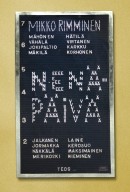 Nenäpäivä
Nenäpäivä
[Nose day]
Helsinki: Teos, 2010. 339 p.
ISBN 978-951-327-1
€ 25.90, hardback
Female protagonists as sympathetic as this are rare in contemporary literature; in this third novel by Mikko Rimminen (born 1975), Irma is a solitary, slightly awkward outsider who gets badly tangled up in a muddle of her own making. She poses as a door-to-door market researcher – in order to meet people. Rimminen employs a more complex plot than in his previous novels (his 2004 debut work, Pussikaljaromaani, ‘A six-pack novel’, about idle young men, has been translated into five languages). The author is an acknowledged master of the slow narration: he is skilled at describing the sound of silence and giving a page-long description of the behaviour of a mobile phone in someone’s hand. All that passes unsaid and unseen between people is cleverly and hilariously put into words. Rimminen’s Finnish is highly original – he keeps creating new verbs and compounds – and his characters who stand on the margins hankering after ordinary life gain the reader’s genuine sympathy.
Riikka Pulkkinen: Totta [True]
22 October 2010 | Mini reviews, Reviews
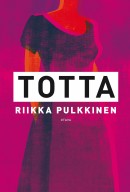 Totta
Totta
[True]
Helsinki: Otava, 2010. 333 p.
ISBN 978-951-1-22965-0
€ 31,40, hardback
The second novel by Riikka Pulkkinen (born 1980) is a comprehensive work that tackles big themes: love, death and rejection. Pulkkinen’s particular strengths as an author are her richly nuanced language and her mastery of structure. While the ending provides food for thought, the book is an enjoyable novel about childhood, growing up, daring to love and live. Martti, a seventy-year-old artist, is caring for his sick wife, a highly respected psychologist. Martti and Elsa have had a long and happy marriage. Then it emerges that Martti had a long affair with their live-in childminder Eeva, whose story grows into one of the main plot strands of the book. Their love story takes place against the background of the 1960s, when the waves passing through European society reached Finland as well. Pulkkinen skilfully brings the perspective of the now grown-up daughter Eleonoora into the mix, as she views her early childhood under the care of two mother figures. At the 2010 Frankfurt Book Fair translation rights to Totta were sold to six countries, which at least goes to show that there is interesting literature to be found in the Nordic countries beyond the ubiquitous crime novels.
Asko Sahlberg: He [They]
28 June 2010 | Mini reviews, Reviews
 He
He
[They]
Helsinki: WSOY, 2010. 120 p.
ISBN 978-0-36170-2
€ 24.10, hardback
The Finland-Swedish author Asko Sahlberg (born 1964), who lives in Gothenburg in Sweden, has had an interesting, if uneven, career over the past decade. Sahlberg’s particular strengths lie in his precise use of language and the rhythm of his prose. Since his debut novel, Pimeän ääni (‘The sound of darkness’, 2000), part of Sahlberg’s output has been concerned with meditations on existence and the purging of emotions, with the rest delving into historical themes, such as his 2004 novel Tammilehto (‘Oak Grove’) which is set in the year 1918, and He, his ninth book, which takes place in 1809. (An extract from his novel Eksyneet (‘The lost’) was published in Books from Finland, 2/2002.) In He Sahlberg uses a first-person narrative technique with multiple narrators, which feels justified in this highly distilled portrait of a family. The plot is set against the backdrop of the Finnish War (1808–1809), waged by King Gustav IV Adolf of Sweden and Alexander I, Emperor of Russia. Henrik and Erik are brothers fighting on opposite sides, their mother drowns her sorrows hard liquor, and Anna, the neighbour’s daughter, ends up with the wrong brother. The end of this novella is surprising, dealing with the anatomy of revenge and deceit.
Leena Lander: Liekin lapset [Children of the flames]
23 June 2010 | Mini reviews, Reviews
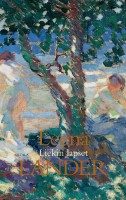 Liekin lapset
Liekin lapset
[Children of the flames]
Helsinki: Siltala, 2010. 419 p.
ISBN 978-952-231-022-1
€ 27.30, hardback
Novels by Leena Lander (born 1959) have been translated into more than 20 languages. Liekin lapset is a family saga, told in two parallel timelines. One is a portrait of a small coastal community in south-western Finland from the turn of the 20th century up to the end of the Finnish civil war in 1918 and the years following it. Life in the area is governed by a sawmill and a manor, socially dividing the community in two. Saida, Joel, Anders and Arvi grow up together, the future workers dreaming of socialism and the sons of the manor playing warlords. In the contemporary strand of the story, Sakari Salin, Saida’s grandson, begins researching his grandmother’s life. The documents reveal some rather remarkable events: here, the author defends the rights of those who were on the losing side in the civil war and creates a lively – as well as historically grounded – portrait of the times. The dialogues and characters in this novel work well, and the structure supports a complex system of psychosocial interconnections, in which the present finds an explanation in the past.
Kari Hotakainen: Ihmisen osa [The human lot]
9 October 2009 | Mini reviews, Reviews
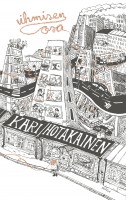 Ihmisen osa
Ihmisen osa
[The human lot]
Helsinki: Siltala, 2009. 276 p.
ISBN 978-952-234-021-4
30 €, hardback
Kari Hotakainen (born 1957) is one of Finland’s most internationally successful contemporary authors, and is widely known for his children’s books, plays and television screenplays. Like many of Hotakainen’s other works, Ihmisen osa is a contemporary novel, but it is one that sees the author being angrier and more ferocious than before; this is a story that will move readers and make them laugh. Its plot gets off to a slightly ungainly start: an impatient writer wants to ‘buy someone’s life’ for the purpose of turning it into material for a novel and is prepared to pay an elderly widow €7,000 for hers. A former yarn-seller tells him all about her life as she remembers it, and the writer writes it up into his own book – the husband’s wilful silence, a serious accident suffered by one of the three children, gradually being revealed. Having got the beginning out of the way, Hotakainen then puts his foot on the gas: in his laconic style he throws light on the conditions at the edges of contemporary working life: the business of selling images, selfishness and greed, the power of words. The yarn-seller writes to one of her children: ‘Don’t rise above your station. There’s no air up there, and you’ll get dizzy.’ Hotakainen’s novel Juoksuhaudantie (‘Trench Road’) was awarded the Finlandia Prize for Fiction in 2002. It has been translated into 17 languages and was awarded the Nordic Council’s Literature Prize in 2004.
Leena Krohn: Valeikkuna [False window]
12 June 2009 | Mini reviews, Reviews
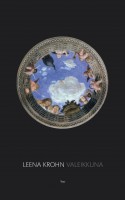 Valeikkuna
Valeikkuna
[False window]
Helsinki: Teos, 2009. 155 p.
ISBN 978-951-851-183-3
€ 21, hardback
The themes of the fiction of Leena Krohn (born 1947) have always included the distinction between life and art, the influence of the media and technology, and the dialogue between truth, illusion and falsehood. In Valeikkuna, her 28th book, the protagonist is a former student of philosophy who has installed a flotation tank in his home, where he spends most of his time, receiving customers to whom he gives advice. The philosopher ‘s teenage daughter lives in the mostly virtual but safe ‘Fake Fake Land’; their home town is ruled by the Dividers League, who use violence to establish their control. The impossibility of defining reality runs as a prominent theme throughout the novel. As is often the case in her novels, Krohn concentrates on the philosophical attitudes of her characters rather than on psychological depth; Valeikkuna is a wise and critical novel, although not perhaps among her best work. Krohn’s books have been translated into 15 languages; her novel Pereat Mundus (1998) is to be issued in English later this year by the San Francisco publisher Omnidawn.
